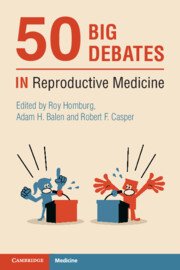Book contents
- 50 Big Debates in Reproductive Medicine
- Series page
- 50 Big Debates in Reproductive Medicine
- Copyright page
- Contents
- Contributors
- Foreword
- Introduction
- Section I Limits for IVF
- Section II IVF Add-ons
- Section III The Best Policy
- Section IV Embryology
- 24A ICSI Should Be Used for All IVF Cycles
- 24B ICSI Should Be Used for All IVF Cycles
- 25A Embryo Morphokinetic Analysis (Time-Lapse Imaging) Is Helpful in Selecting Euploid Blastocysts
- 25B Embryo Morphokinetic Analysis (Time-Lapse Imaging) Is Helpful in Selecting Euploid Blastocysts
- 26A Time-Lapse Imaging Should Be a Routine Procedure in Clinical Embryology
- 26B Time-Lapse Imaging Should Be a Routine Procedure in Clinical Embryology
- 27A Artificial Intelligence Is Useful for Embryo Selection in IVF
- 27B Artificial Intelligence Is Useful for Embryo Selection in IVF
- 28A There Is No Need to Take Embryos Out of the Incubator until the Day of Embryo Transfer
- 28B There Is No Need to Take Embryos Out of the Incubator until the Day of Embryo Transfer
- 29A Blastocyst Culture Should Be a Routine in All IVF Cycles
- 29B Blastocyst Culture Should Be a Routine in All IVF Cycles
- Section V Ethics and Statistics
- Section VI Male-factor Infertility
- Section VII Genetics
- Section VIII Ovarian Stimulation
- Section IX Hormones and the Environment
- Index
- References
24B - ICSI Should Be Used for All IVF Cycles
Against
from Section IV - Embryology
Published online by Cambridge University Press: 25 November 2021
- 50 Big Debates in Reproductive Medicine
- Series page
- 50 Big Debates in Reproductive Medicine
- Copyright page
- Contents
- Contributors
- Foreword
- Introduction
- Section I Limits for IVF
- Section II IVF Add-ons
- Section III The Best Policy
- Section IV Embryology
- 24A ICSI Should Be Used for All IVF Cycles
- 24B ICSI Should Be Used for All IVF Cycles
- 25A Embryo Morphokinetic Analysis (Time-Lapse Imaging) Is Helpful in Selecting Euploid Blastocysts
- 25B Embryo Morphokinetic Analysis (Time-Lapse Imaging) Is Helpful in Selecting Euploid Blastocysts
- 26A Time-Lapse Imaging Should Be a Routine Procedure in Clinical Embryology
- 26B Time-Lapse Imaging Should Be a Routine Procedure in Clinical Embryology
- 27A Artificial Intelligence Is Useful for Embryo Selection in IVF
- 27B Artificial Intelligence Is Useful for Embryo Selection in IVF
- 28A There Is No Need to Take Embryos Out of the Incubator until the Day of Embryo Transfer
- 28B There Is No Need to Take Embryos Out of the Incubator until the Day of Embryo Transfer
- 29A Blastocyst Culture Should Be a Routine in All IVF Cycles
- 29B Blastocyst Culture Should Be a Routine in All IVF Cycles
- Section V Ethics and Statistics
- Section VI Male-factor Infertility
- Section VII Genetics
- Section VIII Ovarian Stimulation
- Section IX Hormones and the Environment
- Index
- References
Summary
The idea that ICSI should be used for all IVF cycles is held by some of my colleagues. The article will debunk the reasoning behind this, by providing rational arguments for the preferential use of conventional IVF (cIVF). Some of the risks associated with ICSI will be highlighted, all of which are eliminated by the use of cIVF. A simple mathematical model will be provided that shows, via use of benchmark KPIs, how more fertilised oocytes can result from cIVF compared to ICSI. This will then be backed up with evidence from studies showing that there is still no data to support the routine use of ICSI for non-male factor infertility. More worryingly, there is now data to show that ICSI actually decreases the chance of success compared to cIVF. Finally, the additional costs associated with providing ICSI will be revealed, showing the vast amount of money that is paid to clinics for patients to access ICSI treatment, when cIVF would have offered them a better chance of conception.
- Type
- Chapter
- Information
- 50 Big Debates in Reproductive Medicine , pp. 128 - 130Publisher: Cambridge University PressPrint publication year: 2021



